On the 28th October 2012 the Parliamentary Elections in Ukraine took place. As AEGEE-Europe has the rights to send observers for the Election Observation Mission (EOM) in the middle of October there was an open call for EOM participants. A member of AEGEE Salerno, Luisa Marino was the only representative of our beloved association and took this honorary role. So now we are happy to share her experience and impressions with you in the following report from the first person.
I had the honour to represent AEGEE in this Observation Mission in Ukraine. Despite the initial uncertainty about the accreditation by the Central Electoral Committee and serious communication delays, I was able to carry out my tasks in the best way.
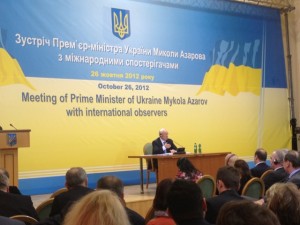
As soon as I arrived in Kiev on the 27th October, I attended the meeting with the Prime Minister of Ukraine Mykola Azarov and the other International Observers.
Many issues have been touched during the meeting:
– The introduction of cameras in the polling stations. For the first time in Ukraine two cameras per polling stations have been installed in order to assure the fairness of the process.
Observation comment: I’ve asked some questions about this issue to a Ukrainian man during the e-day. In his opinion the introduction of camera is just a business matter and an attempt to emulate the Russian government.
– The role of the International Observers.
– Media coverage of the elections. Balanced coverage remains undefined in the Electoral law as well as mechanisms for monitoring. State TV displayed a clear partiality in favour of the ruling party.
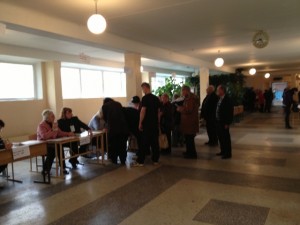
– How the electoral process will be influenced by the fact that 2 leaders of the opposition were not able to run as candidates (Viktor Yushchenko and Yulia Tymoshenko).
– The new Electoral law, adopted in November 2011.
Election Day
The official international observers are used to visit between 10 and 15 polling stations (PS). Two Observers, a driver and an interpreter compose the teams.
The organisation of my e-day was a bit different as I was alone, I don’t speak Ukrainian, and I had any interpreter neither a car nor a driver. For these reasons I visited a total of 7 polling stations in the East Kiev area.
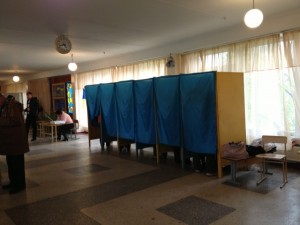
Observation comments:
1) I assisted to the opening procedures in a pooling station where there were many domestic party observers who attempted to influence voters inside and outside the polling station. In fact, this PS has been reported to the international observers and during the closing and counting procedure one team of the Observation Mission of the Parliamentary Assembly of the Council of Europe was present.
2) The logistic inside some PS wasn’t adequate. The light inside the voting cabins was not enough, for this reason many persons (especially the older persons) weren’t able to vote inside and voted outside the cabins. This means that the secrecy of the vote wasn’t guaranteed.
3) I report here the opinion of a Ukrainian voter: “If something irregular happens it is not inside the polling stations but at the Central level where no opposition parties representatives are present”.
The general evaluation of the process I observed (from the opening till the counting) is positive. In addition, the Chairperson of each PS always welcomed me. I want to underline the exceptional hospitality of the Ukrainian people.
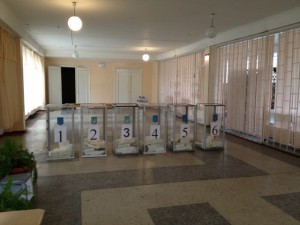
However, there was a general lack of confidence in the election administration, in fact many Ukrainians claimed that election commissioners nominated by ‘technical parties’ were in fact affiliated with other parties, especially with the ruling Party of Regions, as confirmed by OSCE.
During my observation day I assisted to a lively discussion between members of different political parties concerning this issue.Only in two PS I felt tension upon my arrival and during my presence, but I never was refused or restricted in my observation.
Some data and reports
According to the OSCE, the voting process was assessed positively in 96 per cent of polling stations observed. The tabulation process was assessed negatively in one third of the 181 reports of international observers.
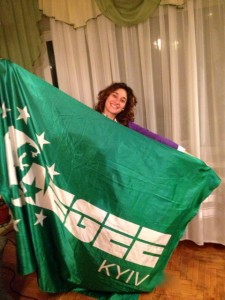
With 87.08% of the ballots counted in Ukraine’s parliamentary elections, the Regions Party took the votes of 17.471,150 Ukrainians have been counted.31.82% of the vote, the Batkivschyna United Opposition 24.22%, the Communist Party of Ukraine 13.88%, UDAR 13.47%, and Svoboda 9.61%.
Aknowledgments
I would like to thank the Eastern Partnership Project and Alla for this great experience!
A special thanks to AEGEE Kiev and to its member Maks Kovalenko who kindly hosted me in Kiev.
I am glad that AEGEE has resumed this practice that was lost through the years. I hope that other members will have the opportunity to take part in the democratic process through the provision of future AEGEE observation missions.
If you consider it important for AEGEE to continue executing the Observation Mission follow the discussion here.
By Daryna Skryl, AEGEE-Dnipropetrovsk, & Luisa Marino, AEGEE-Salerno

